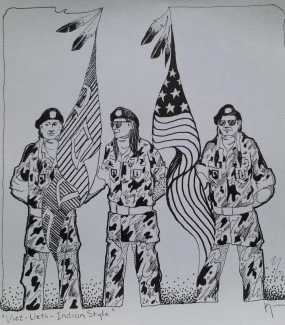
Artwork © 2021 Bruce King.
Used with permission.
It’s estimated that in the coming decades, approximately 450,000 Veterans will be diagnosed with Alzheimer’s disease. Veterans, especially combat Veterans, are at a higher risk for developing dementia than the general public.
Health care providers believe the increased risk in Veterans can be attributed to the heart-head connection. Veterans experience high cholesterol, traumatic brain injury, post-traumatic stress disorder, and depression at higher rates than the non-military population — all health concerns that increase a person’s risk for developing Alzheimer’s disease.
While scientists know these differences exist, they do not know why. We hope Alzheimer’s disease research studies can help us better understand risk and prevention.
What You Can Do
Prevention
Scientists have found evidence that some lifestyle changes can delay the onset or lower the risk for Alzheimer’s disease. Visit our Prevention page to learn about recommendations to improve your brain health.
Join an Alzheimer’s disease research study
Research study participants contribute to the scientific understanding of Alzheimer’s disease and related dementias. They can also learn about their own health and strategies to improve brain health.
The Wisconsin ADRC is recruiting Veterans for its Clinical Core. We are looking for people who meet one of the following criteria:

- Diagnosis of mild cognitive impairment (MCI)
- Diagnosis of dementia due to Alzheimer's disease
- Age 45-65 with or without a parental history of Alzheimer's disease
If you are a Veteran who is interested in volunteering for research, learn how in this PDF research recruitment flyer.
If you are an American Indian Veteran who is interested in volunteering for research, learn how in this PDF research recruitment flyer.
If you do not meet the criteria for the Clinical Core, you can complete the Wisconsin ADRC Research Recruitment Registry Enrollment Form. The Recruitment Registry holds the names and eligibility information of potential research volunteers. When new studies become available, Wisconsin ADRC staff will use the Recruitment Registry to identify persons who may qualify for new study opportunities.



